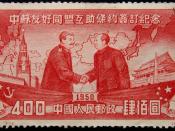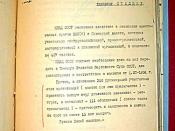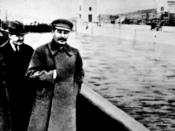Stalin believed that the Russian's could build a Communist state in the USSR without the help of foreign countries. He called this policy 'Socialism in One Country'. In the period of 1928 to 1932, Stalin's most significant step towards 'Socialism in One Country' was the introduction of the first of the three five-year Plans. In 1928 Russia was still an industrially limited country. It produced less industrial goods than many smaller countries. Through rapid industrialization and collectivization of agriculture, Stalin aimed to erase all traces of the capitalism that had entered under the New Economic Policy, and transform the Soviet Union as quickly as possible, without regard to cost, into an industrialized and completely socialist state. Stalin's first five-year Plan, adopted by the party in 1928, called for the rapid industrialization of the economy, with an emphasis on heavy industry. Goals were set which were completely unrealistic, but it generally raised the work forces' morale because many thought they were contributing to the transformation of Russia.
The collectivization of agriculture in Russia consisted of peasants in a particular area to be encouraged into joining their plots of land to create a collective farm. The government would therefore have greater control over the peasants, and be one step closer towards 'Socialism in One Country'. An examination of Stalin's achievements and changes in Soviet society in the years 1928 to 1932 will reveal if Stalin achieved his purpose of establishing 'Socialism in One Country', thereby completing the Bolshevik Revolution in Russia.
To have a view of Stalin's achievements, you must be aware of the many theoretical tasks of the five-year plan. The plan was to transfer Russia on to the lines of new, modern technology. It was to convert the USSR from a weak country, dependent upon foreign countries,


